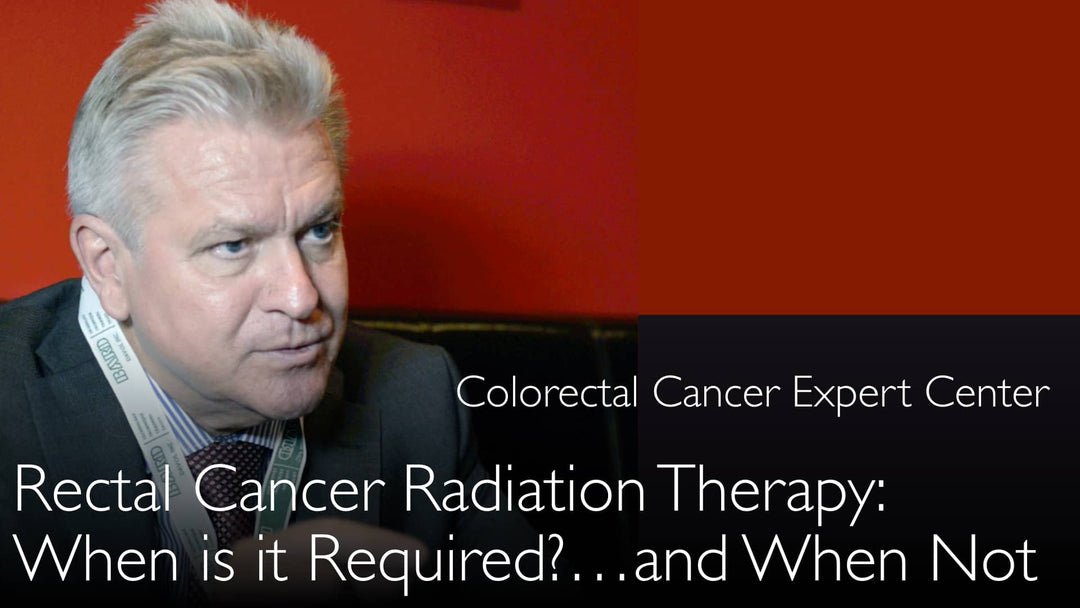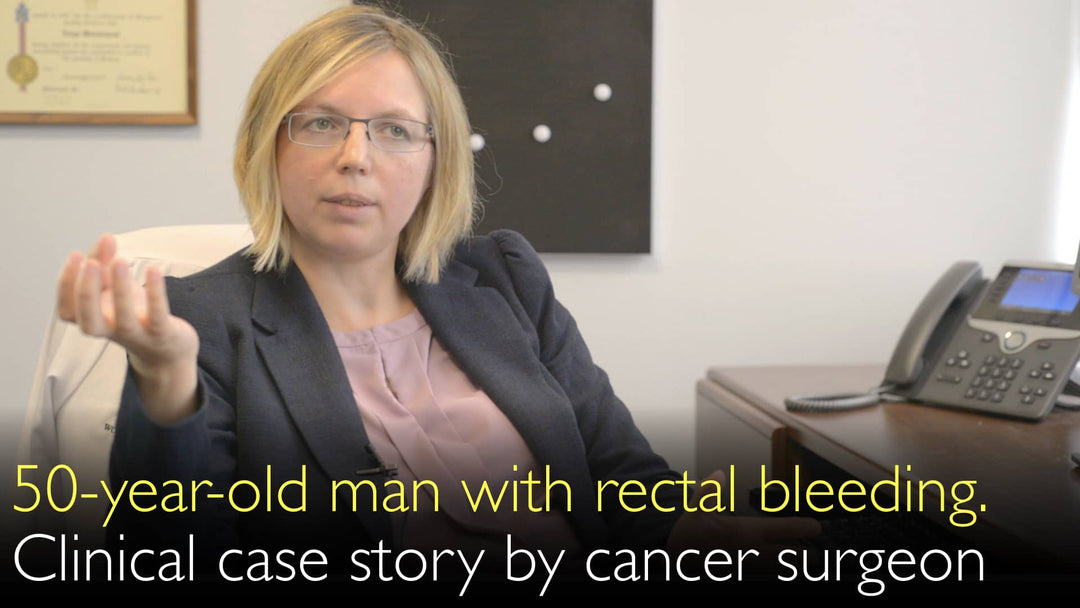מומחה מוביל בכירורגיה קולורקטלית, ד"ר טורביורן הולם, MD, מסביר כיצד טיפול בקרינה לסרטן החלחולת מהווה כלי רב עוצמה לגידולים מקומיים מתקדמים אך יש להימנע ממנו בסרטן בשלב מוקדם כדי למנוע סיבוכים משמעותיים בטווח הקצר והארוך. הוא מפרט את התפתחות הטיפול בסרטן החלחולת משיעורי הישנות גבוהים לגישה המודרנית המשלבת ניתוח כריתת מזנטריון מלאה עם כימותרפיה וקרינה ממוקדת טרום ניתוחית, אשר הפחיתה את הסיכון להישנות מקומית לפחות מ-5%.
אופטימיזציה של הטיפול בסרטן הרקטום: מתי טיפול בקרינה נחוץ
קפיצה לפרק
- היסטוריה של הטיפול בסרטן הרקטום
- השפעת הטיפול בקרינה על הישנות המחלה
- תפקיד ניתוח TME
- גישה טיפולית מודרנית
- זיהוי מועמדים לטיפול בקרינה
- סיכוני סיבוכי קרינה
- חשיבות הבחירה הטיפולית
היסטוריה של הטיפול בסרטן הרקטום
ד"ר טורביורן הולם, MD, מספק הקשר קריטי על ההיסטוריה של הטיפול בסרטן הרקטום. הוא מציין שתוצאות הטיפול היו גרועות ברמה הבינלאומית עד אמצע שנות ה-90. הסיכון להישנות מקומית, שבה הסרטן חוזר באגן לאחר הניתוח, היה גבוה באופן מדאיג - 25% עד 30% גם כאשר המנתחים האמינו שביצעו ניתוח רדיקלי.
שיעור הכישלון הגבוה הזה הוביל ליזום ניסויים קליניים בשטוקהולם בשנות ה-80. המטרה הייתה למצוא דרכים לשפר את התוצאות העגומות הללו ולהפחית את שיעורי ההישנות של סרטן הרקטום באמצעות אסטרטגיות חדשות כמו טיפול בקרינה.
השפעת הטיפול בקרינה על הישנות המחלה
ניסויי סרטן הרקטום השוודים ייצגו התקדמות משמעותית באונקולוגיה. ד"ר טורביורן הולם, MD, מסביר שמחקרים אלה חילקו באופן אקראי חולים לניתוח בלבד או לטיפול בקרינה לפני ניתוח ולאחריו ניתוח.
התוצאות היו מהפכניות. מתן טיפול בקרינה לפני ניתוח הפחית את הסיכון להישנות מקומית ב-50%. זה הוריד את שיעור ההישנות מ-25% לכ-12%, והוכיח את היעילות של קרינה נאו-אדג'ובנטית לסרטן הרקטום.
תפקיד ניתוח TME
פריצת דרך ניתוחית subsequent (בהמשך) חוללה מהפכה נוספת בטיפול. ד"ר טורביורן הולם, MD, מדגיש את תרומתו של פרופ' ביל הילד, שחלוץ בטכניקה של כריתה טוטאלית של המזורקטום (TME - Total Mesorectal Excision).
שיטה ניתוחית מדוקדקת זו כוללת הסרה של כל המזורקטום, רקמת השומן המקיפה את הרקטום שמכילה קשרי לימפה. שילוב ניתוח TME עם טיפול בקרינה הניב תוצאות דרמטיות אף יותר, וחתך את שיעורי ההישנות המקומית לפחות מ-5%.
גישה טיפולית מודרנית
הפרדיגמה המודרנית לטיפול בסרטן הרקטום התפתחה משמעותית. ד"ר טורביורן הולם, MD, מתאר גישה מורכבת יותר. המטוטלת נעה מהאמונה שכל חולה צריך טיפול בקרינה להבנה שניתוח באיכות גבוהה הוא אבן היסוד של הטיפול.
לגידולים בשלב מוקדם ושטחיים שקל לכרות, ניתוח בלבד לרוב מספיק. שינוי זה נמנע מחשיפה מיותרת לקרינה ולתופעות הלוואי שלה עבור חולים שניתן לרפאם בניתוח בלבד.
זיהוי מועמדים לטיפול בקרינה
טיפול בקרינה נותר חיוני עבור תת-קבוצה ספציפית של חולים. ד"ר טורביורן הולם, MD, מבהיר שהוא מיועד לסרטן רקטום locally advanced (מקומי מתקדם).
זה כולל גידולים שחודרים לפאציה המזורקטלית או מקרים עם מספר קשרי לימפה המעורבים בסרטן. עבור חולים אלה, טיפול בקרינה לפני ניתוח משולב לרוב עם כימותרפיה (כימו-קרינה) כדי להקטין את הגידול לפני כריתה ניתוחית, ולשפר את סיכויי ההצלחה.
סיכוני סיבוכי קרינה
העוצמה של הקרינה מגיעה עם מחיר משמעותי. ד"ר טורביורן הולם, MD, מדגיש שטיפול בקרינה עלול לגרום לסיבוכים מוקדמים ומאוחרים.
תופעות לוואי קצרות טווח יכולות לכלול גירוי בעור, עייפות ושלשול. סיבוכים ארוכי טווח חמורים יותר ועלולים לכלול תפקוד מעיים ושלפוחית כרוניים, תפקוד מיני לקוי ואף סרטן משני. זו הסיבה שנמנעים מטיפול מיותר כעקרון מרכזי.
חשיבות הבחירה הטיפולית
בחירת הטיפול הנכון עבור כל individuum (אדם) היא בעלת חשיבות עליונה. ד"ר טורביורן הולם, MD, מסיים עם עקרון מנחה: קרינה היא כלי חזק למקרים מתקדמים, אך אם אין חובה להשתמש בה - אין להשתמש.
זה מדגיש את החשיבות של אבחנה ראשונית מדויקת ושלבּוּת. חוות דעת רפואית שנייה יכולה להיות בעלת ערך רב כדי לאשר את שלב הסרטן ולהבטיח שתוכנית הטיפול - בין אם它包括 ניתוח בלבד או טיפול multi-modality (רב-מודאלי) עם כימו-קרינה - היא האפשרות הטובה והמתאימה ביותר עבור החולה.
תמליל מלא
ד"ר אנטון טיטוב, MD: מתי טיפול בקרינה עוזר לחולי סרטן הרקטום? מתי טיפול בקרינה бесполез? האם טיפול בקרינה רק גורם לרעילות? כיצד יש להשתמש נכון בטיפול בקרינה בסרטן הרקטום?
ד"ר טורביורן הולם, MD: שוב, עלינו לזכור את ההיסטוריה שלנו. הטיפול בסרטן הרקטום לא היה טוב בשוודיה ובינלאומית עד אמצע או סוף שנות ה-90. עלינו לזכור שהסיכון להישנות מקומית של סרטן הרקטום היה כ-25% עד 30%, אף שמנתחי סרטן הרקטום חשבו שביצעו ניתוח רדיקלי. הישנות מקומית משמעה שסרטן הרקטום חוזר באגן לאחר הניתוח.
הסיכון להישנות סרטן הרקטום היה גבוה מאוד. ב-1980, התחלנו ניסוי קליני בשטוקהולם כדי ללמוד כיצד נוכל לשפר את שיעורי ההישנות של סרטן הרקטום. התחלנו ניסויים קליניים בטיפול בקרינה בסרטן הרקטום. затем (אז) התחלנו את ניסויי סרטן הרקטום השוודים. חילקנו באופן אקראי חולי סרטן הרקטום לעבור ניתוח ישיר; חולים אחרים קיבלו טיפול בקרינה לסרטן הרקטום ולאחריו ניתוח.
ערכנו ניסויים קליניים בסרטן הרקטום כי תוצאות הטיפול הניתוחי היו כה גרועות. יכולנו להראות שמתן טיפול בקרינה לחולה סרטן הרקטום לפני ניתוח הפחית את הסיכון להישנות מקומית של סרטן הרקטום ב-50%. כך שהסיכון שסרטן הרקטום יחזור מקומית לאחר ניתוח ירד מכ-25% לכ-12% לאחר שהחולה קיבל טיפול בקרינה לפני ניתוח לסרטן הרקטום.
אך затем פרופ' ביל הילד לימד אותנו how to do (כיצד לבצע) כריתה טוטאלית של המזורקטום (TME) לסרטן הרקטום. затем (אז) הראינו ששילוב טיפול בקרינה עם כריתה טוטאלית של המזורקטום (TME) לסרטן הרקטום הפחית את שיעורי ההישנות המקומית לפחות מ-5%. затем (אז) הערכנו מחדש את אפשרויות הטיפול שלנו בסרטן הרקטום.
אנו now (כעת) חושבים שהאפשרות החשובה ביותר לטיפול בסרטן המעי הגס היא ניתוח. לפעמים מבצעים ניתוח טוב לסרטן הרקטום, ואז לא צריך טיפול בקרינה. זה נכון במיוחד עבור סרטן רקטום שהתגלה בשלב מוקדם more. אז המטוטלת חזרה שוב.
Before (לפני), חשבנו that every (שכל) חולה סרטן רקטום must (חייב) לקבל טיפול בקרינה לפני ניתוח. now (עכשיו) אנחנו מבינים that with (שעם) ניתוח טוב, you don't need (אין צורך) לתת טיפול בקרינה לכולם עם סרטן הרקטום. you need (צריך) לתת טיפול בקרינה לכמה חולי סרטן רקטום שיש להם סרטן רקטום locally advanced (מקומי מתקדם).
Today (היום), הפרקטיקה של טיפול בסרטן הרקטום is this (היא זו). לפעמים יש סרטן רקטום more advanced (מתקדם יותר) שחודר לפאציה המזורקטלית, או שיש several (מספר) קשרי לימפה המעורבים בסרטן המעי הגס. then (אז) should (צריך) לתת לחולה סרטן הרקטום טיפול בקרינה. often (לעתים קרובות) you have to (צריך) לשלב טיפול בקרינה עם כימותרפיה, and then (ואז) מבצעים ניתוח סרטן רקטום after (לאחר) כימותרפיה וטיפול בקרינה.
Some (כמה) חולים have (יש) גידול שטחי של סרטן הרקטום ש could be (יכול להיות) קל לכרות. then (אז) the cancer surgeon (מנתח הסרטן) does not need (לא צריך) לתת לחולה סרטן הרקטום טיפול בקרינה, because (כי) טיפול בקרינה לסרטן הרקטום can also (עלול גם) לגרום להרבה סיבוכים.
ד"ר אנטון טיטוב, MD: סיבוכים after (לאחר) טיפול בקרינה לסרטן הרקטום יכולים להיות both (גם) סיבוכים מוקדמים and (וגם) סיבוכים מאוחרים.
ד"ר טורביורן הולם, MD: טיפול בקרינה הוא כלי חזק למקרים מתקדמים של סרטן הרקטום. but (אבל) if (אם) you don't have to (אין חובה) להשתמש בטיפול בקרינה, you shouldn't do it (אין להשתמש), because (כי) טיפול בקרינה can give (עלול לגרום) לסיבוכים בחולי סרטן המעי הגס in the short term (בטווח הקצר) and (ו) in the long term (בטווח הארוך).








